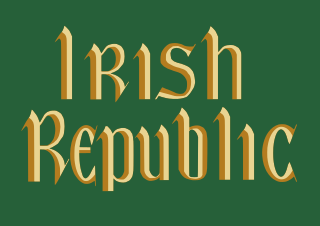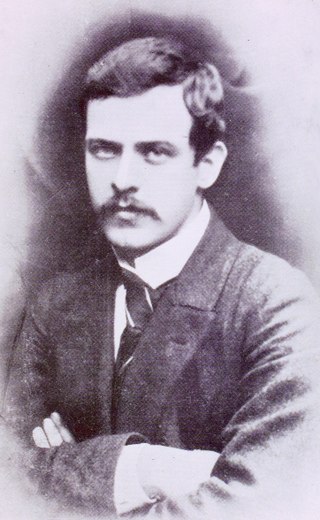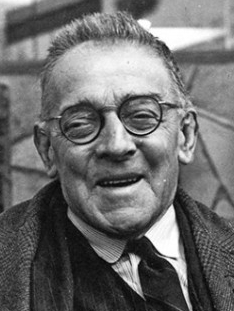See also
- United Ireland (disambiguation)
- Society of United Irishmen, organised the Irish Rebellion of 1798
The United Irishman was an Irish nationalist newspaper founded in 1899 by Arthur Griffith and William Rooney.
United Irishman may also refer to:

Sinn Féin is an Irish republican and democratic socialist political party in both the Republic of Ireland and Northern Ireland.

Arthur Joseph Griffith was an Irish writer, newspaper editor and politician who founded the political party Sinn Féin. He led the Irish delegation at the negotiations that produced the 1921 Anglo-Irish Treaty, and served as the president of Dáil Éireann from January 1922 until his death later in August.

Sinn Féin was a weekly Irish nationalist newspaper edited by the Dublin typesetter, journalist and political thinker Arthur Griffith. It was published by the Sinn Féin Printing & Publishing Company Ltd. (SFPP) between 1906 and 1914, and replaced an earlier newspaper called the United Irishman which was liquidated after a libel suit. The SFPP brought out the Sinn Féin Daily in 1909 but had to abandon it when it plunged the company into enormous debt. The Sinn Féin weekly and the SFPP both came to an end when they were suppressed by the British Government in 1914.
The United Irishman was an Irish nationalist newspaper co-founded by Arthur Griffith and William Rooney. It was first published on the 4th of March 1899 and ran from 1899 to 1906. Contributors included Oliver St. John Gogarty, Pádraig Pearse, Maud Gonne and Roger Casement. The writer James Joyce is quoted as saying that the United Irishman was "the only newspaper of pretensions in Ireland". In 1906 the United Irishman collapsed under a libel suit and was refounded as Sinn Féin, which ran until 1914 when it was suppressed by the British government.

The Irish Republican Army (IRA) is a name used by various resistance organisations in Ireland throughout the 20th and 21st centuries. Organisations by this name have been dedicated to anti-imperialism through Irish republicanism, the belief that all of Ireland should be an independent republic free from British rule.
The republican movement refers to the Irish Republican Army (IRA) and other political, social and paramilitary organisations and movements associated with it. It can refer to:

The Starry Plough is the official newsletter of the Irish Republican Socialist Party. In 2006 it proclaimed on its website that "The Starry Plough is the only paper that stands firmly against British rule and for the destruction of capitalism in Ireland." The paper also focuses on socialist solidarity issues around the world.

Seán MacManus is an Irish Sinn Féin politician, and was the national chairperson of the party from 1984 to 1990.

Desmond Ellis is an Irish Sinn Féin politician who has been a Teachta Dála (TD) for the Dublin North-West constituency since the 2011 general election. During the 1970s and 1980s Ellis was a member of the Provisional IRA until his arrest in Ireland in 1981. Ellis subsequently fled Ireland before being recaptured in the United States and returned to Irish authorities. In 1983 Ellis was found guilty of possessing materials used to make explosive devices for the IRA and was sentenced to 10 years imprisonment by an Irish court. In 1990 Ellis was the first person extradited from the Republic of Ireland to the United Kingdom under the 1987 Extradition Act, on charges of terrorism on charges related to the 1982 Hyde Park and Regent's Park bombings as well as the 1983 Harrods bombing, however Ellis was acquitted of these charges in 1991. Ellis moved into constitutional politics in 1999 when he was elected to Dublin City Council, a position he held until he was elected to his current position as a Teachta Dála.
The Sinn Féin Printing & Publishing Company, Ltd. (1906–1914) was a Dublin-based enterprise founded by Arthur Griffith, chief propagandist of the nationalist Sinn Féin movement. It published, and for several years also printed, the influential weekly newspaper Sinn Féin. It also very briefly printed and published a daily paper. The company was close to bankruptcy in 1914 when it was closed down for sedition by the British authorities under the provisions of the Defence of the Realm Act.
Henry Dixon was an Irish republican. He was a member of several nineteenth-century nationalist societies, a founding member of Sinn Féin, and a director of the Sinn Féin Printing & Publishing Company.

Seán Mac Stíofáin was an English-born chief of staff of the Provisional IRA, a position he held between 1969 and 1972.
The Irish People was the title of a number of mostly political newspapers in Ireland and the United States.

William Rooney, also known as Fear na Muintire, was an Irish nationalist, journalist, poet and Gaelic revivalist. Along with Arthur Griffith and Denis Devereux he founded the Celtic Literary Society, and with Griffith founded the first Cumann na nGaedheal.

Joe Clarke was an Irish republican politician.
Sinn Féin is an Irish political party.
Cumann na nGaedheal, was a political organisation founded in 1900 by Arthur Griffith and William Rooney. Griffith had written an article in the United Irishman newspaper in March 1900, calling for the creation of an association to bring together the disparate nationalist groups of the time, and the result was the formation of Cumann na nGaedheal in September of that year.

The Citizen is a fictional character in James Joyce's novel Ulysses. In part, he is a satirical portrait of Irish nationalist Michael Cusack (1847–1906) and Joyce's portrayal operates to expose what one critic called the "xenophobic ideologies of radical Celticists".The Citizen appears to be a devotee of the Celtic Revival and Irish Republicanism and is well versed in the history of the Irish struggle for freedom against the British empire. He also appears to be interested in Arthur Griffith's program for a limited Irish autonomy modeled on Hungary's dual monarchy and uses the name of Griffith's newspaper and later of the political party he inspired as a riposte to Leopold's Bloom's assertions about the futility of armed rebellion as part of his xenophobic and anti-semitic views expressed in Barney Kiernan's pub. He ultimately accuses Bloom of being an economic parasite on the Irish and a "foreign" Jew and thus an inauthentic Irishman, as well being cursed by God for rejecting Christ's divinity as symbolized in the apocryphal Christian figure of Ahasuerus. As a gesture of his hatred, the Citizen throws a biscuit tin at Bloom as he departs from the pub. A character based on Cusack also appears in Stephen Hero, described as very stout, black-bearded, always wearing a wideawake hat and a long bright green muffler, with "the voice of an ox... he could be heard at a great distance, criticising, denouncing and scoffing."
Eoin Ó Murchú is a writer and retired journalist in both Irish and English, a political activist and a former member of Official Sinn Féin/the Workers' Party, and the Communist Party of Ireland. He is currently the interim national chairperson of the Irish Communist Party.

The United Irishman/An tÉireannach Aontaithe, first published in May 1948, under Michael Traynor, was the official monthly organ of Sinn Féin sold by its members. After the split in the Irish Republican Movement, the title continued as the organ of Official Sinn Féin, being published from the offices in 30 Gardner Place in Dublin, with the Provisional wing publishing An Phoblacht. The first editor was Seán G. O'Kelly based in an office in 38 South King Street in Dublin. The historian Éamonn MacThomáis edited the paper for a short while prior to the 1970 split in Sinn Féin. Other editors of the paper included Seán Cronin, Seán Ó Brádaigh (1958–1960), Ruairí Ó Brádaigh, Eoin Ó Murchú, Jackie Ward, Seamus Ó Tuathail, Denis Foley and Tony Meade (1967). Contributors to the paper included Eamon McCann, Roy Johnston, Eamon Smullen, Eoghan Harris and Sean Garland. The United Irishman was replaced with The Irish People and the Workers' Weekly in 1980.